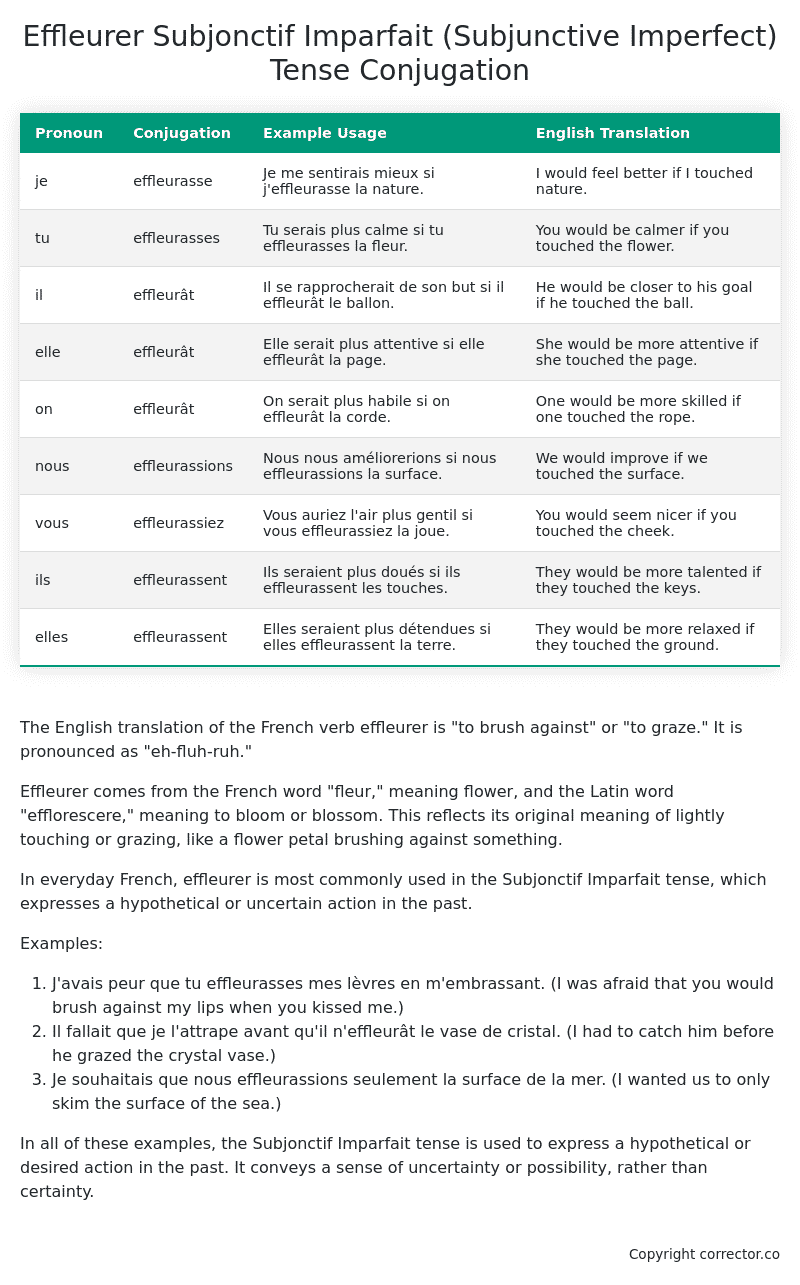Subjonctif Imparfait (Subjunctive Imperfect) Tense Conjugation of the French Verb effleurer
Introduction to the verb effleurer
The English translation of the French verb effleurer is “to brush against” or “to graze.” It is pronounced as “eh-fluh-ruh.”
Effleurer comes from the French word “fleur,” meaning flower, and the Latin word “efflorescere,” meaning to bloom or blossom. This reflects its original meaning of lightly touching or grazing, like a flower petal brushing against something.
In everyday French, effleurer is most commonly used in the Subjonctif Imparfait tense, which expresses a hypothetical or uncertain action in the past.
Examples:
- J’avais peur que tu effleurasses mes lèvres en m’embrassant. (I was afraid that you would brush against my lips when you kissed me.)
- Il fallait que je l’attrape avant qu’il n’effleurât le vase de cristal. (I had to catch him before he grazed the crystal vase.)
- Je souhaitais que nous effleurassions seulement la surface de la mer. (I wanted us to only skim the surface of the sea.)
In all of these examples, the Subjonctif Imparfait tense is used to express a hypothetical or desired action in the past. It conveys a sense of uncertainty or possibility, rather than certainty.
Table of the Subjonctif Imparfait (Subjunctive Imperfect) Tense Conjugation of effleurer
| Pronoun | Conjugation | Example Usage | English Translation |
|---|---|---|---|
| je | effleurasse | Je me sentirais mieux si j’effleurasse la nature. | I would feel better if I touched nature. |
| tu | effleurasses | Tu serais plus calme si tu effleurasses la fleur. | You would be calmer if you touched the flower. |
| il | effleurât | Il se rapprocherait de son but si il effleurât le ballon. | He would be closer to his goal if he touched the ball. |
| elle | effleurât | Elle serait plus attentive si elle effleurât la page. | She would be more attentive if she touched the page. |
| on | effleurât | On serait plus habile si on effleurât la corde. | One would be more skilled if one touched the rope. |
| nous | effleurassions | Nous nous améliorerions si nous effleurassions la surface. | We would improve if we touched the surface. |
| vous | effleurassiez | Vous auriez l’air plus gentil si vous effleurassiez la joue. | You would seem nicer if you touched the cheek. |
| ils | effleurassent | Ils seraient plus doués si ils effleurassent les touches. | They would be more talented if they touched the keys. |
| elles | effleurassent | Elles seraient plus détendues si elles effleurassent la terre. | They would be more relaxed if they touched the ground. |
Other Conjugations for Effleurer.
Le Present (Present Tense) Conjugation of the French Verb effleurer
Imparfait (Imperfect) Tense Conjugation of the French Verb effleurer
Passé Simple (Simple Past) Tense Conjugation of the French Verb effleurer
Passé Composé (Present Perfect) Tense Conjugation of the French Verb effleurer
Futur Simple (Simple Future) Tense Conjugation of the French Verb effleurer
Futur Proche (Near Future) Tense Conjugation of the French Verb effleurer
Plus-que-parfait (Pluperfect) Tense Conjugation of the French Verb effleurer
Passé Antérieur (Past Anterior) Tense Conjugation of the French Verb effleurer
Futur Antérieur (Future Anterior) Tense Conjugation of the French Verb effleurer
Subjonctif Présent (Subjunctive Present) Tense Conjugation of the French Verb effleurer
Subjonctif Passé (Subjunctive Past) Tense Conjugation of the French Verb effleurer
Subjonctif Imparfait (Subjunctive Imperfect) Tense Conjugation of the French Verb effleurer (this article)
Subjonctif Plus-que-parfait (Subjunctive Pluperfect) Tense Conjugation of the French Verb effleurer
Conditionnel Présent (Conditional Present) Tense Conjugation of the French Verb effleurer
Conditionnel Passé (Conditional Past) Tense Conjugation of the French Verb effleurer
L’impératif Présent (Imperative Present) Tense Conjugation of the French Verb effleurer
L’infinitif Présent (Infinitive Present) Tense Conjugation of the French Verb effleurer
Struggling with French verbs or the language in general? Why not use our free French Grammar Checker – no registration required!
Get a FREE Download Study Sheet of this Conjugation 🔥
Simply right click the image below, click “save image” and get your free reference for the effleurer Subjonctif Imparfait tense conjugation!

Effleurer – About the French Subjonctif Imparfait (Subjunctive Imperfect) Tense
Formation
Common Everyday Usage Patterns
Interactions with Other Tenses
Subjonctif Présent
Indicatif Passé Composé
Conditional
Conditional Perfect
Summary
I hope you enjoyed this article on the verb effleurer. Still in a learning mood? Check out another TOTALLY random French verb conjugation!


